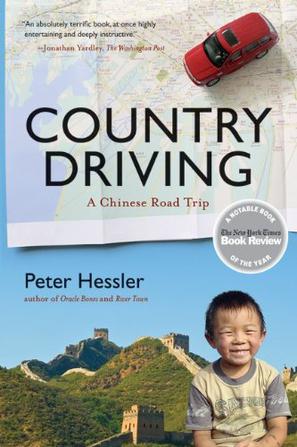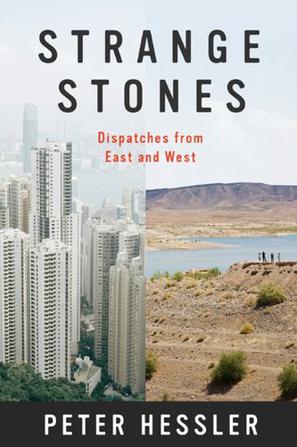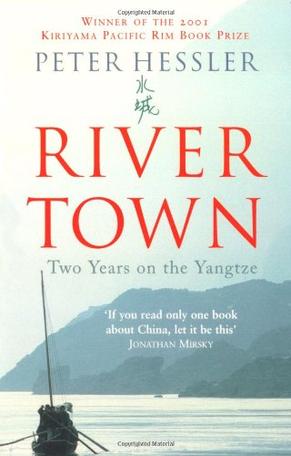-

Country Driving
-

River Town
In 1996, 26-year-old Peter Hessler arrived in Fuling, a town on China's Yangtze River, to begin a two-year Peace Corps stint as a teacher at the local college. Along with fellow teacher Adam Meier, the two are the first foreigners to be in this part of the Sichuan province for 50 years. Expecting a calm couple of years, Hessler at first does not realize the social, cultural, and personal implications of being thrust into a such radically different society. In River Town: Two Years on the Yangtze, Hessler tells of his experience with the citizens of Fuling, the political and historical climate, and the feel of the city itself. "Few passengers disembark at Fuling ... and so Fuling appears like a break in a dream--the quiet river, the cabins full of travelers drifting off to sleep, the lights of the city rising from the blackness of the Yangtze," says Hessler. A poor city by Chinese standards, the students at the college are mainly from small villages and are considered very lucky to be continuing their education. As an English teacher, Hessler is delighted with his students' fresh reactions to classic literature. One student says of Hamlet, "I don't admire him and I dislike him. I think he is too sensitive and conservative and selfish." Hessler marvels, You couldn't have said something like that at Oxford. You couldn't simply say: I don't like Hamlet because I think he's a lousy person. Everything had to be more clever than that ... you had to dismantle it ... not just the play itself but everything that had ever been written about it. Over the course of two years, Hessler and Meier learn more they ever guessed about the lives, dreams, and expectations of the Fuling people. Hessler's writing is lovely. His observations are evocative, insightful, and often poignant--and just as often, funny. It's a pleasure to read of his (mis)adventures. Hessler returned to the U.S. with a new perspective on modern China and its people. After reading River Town, you'll have one, too. --Dana Van Nest, Amazon.com -

Strange Stones
Full of unforgettable figures and an unrelenting spirit of adventure, Strange Stones is a far-ranging, thought-provoking collection of Peter Hessler’s best reportage—a dazzling display of the powerful storytelling, shrewd cultural insight, and warm sense of humor that are the trademarks of his work. Over the last decade, as a staff writer for The New Yorker and the author of three books, Peter Hessler has lived in Asia and the United States, writing as both native and knowledgeable outsider in these two very different regions. This unusual perspective distinguishes Strange Stones, which showcases Hessler’s unmatched range as a storyteller. “Wild Flavor” invites readers along on a taste test between two rat restaurants in South China. One story profiles Yao Ming, basketball star and China’s most beloved export, another David Spindler, an obsessive and passionate historian of the Great Wall. In “Dr. Don,” Hessler writes movingly about a small-town pharmacist and his relationship with the people he serves. While Hessler’s subjects and locations vary, subtle but deeply important thematic links bind these pieces—the strength of local traditions, the surprising overlap between apparently opposing cultures, and the powerful lessons drawn from individuals who straddle different worlds. -

River Town
When Peter Hessler went to China in the late 1990s, he expected to spend a couple of peaceful years teaching English in the town of Fuling on the Yangtze River. But what he experienced - the natural beauty, cultural tension, and complex process of understanding that takes place when one is thrust into a radically different society - surpassed anything he could have imagined. Hessler observes firsthand how major events such as the death of Deng Xiaoping, the return of Hong Kong to the mainland, and the controversial consturction of the Three Gorges Dam have affected even the people of a remote town like Fuling. Poignant, thoughtful and utterly compelling, "River Town" is an unforgettable portrait of a place caught mid-river in time, much like China itself - a country seeking to understand both what it was and what it will one day become. -

Country Driving
From the bestselling author of Oracle Bones and River Town comes the final book in his award-winning trilogy, on the human side of the economic revolution in China. In the summer of 2001, Peter Hessler, the longtime Beijing correspondent for The New Yorker , acquired his Chinese driver's license. For the next seven years, he traveled the country, tracking how the automobile and improved roads were transforming China. Hessler writes movingly of the average people—farmers, migrant workers, entrepreneurs—who have reshaped the nation during one of the most critical periods in its modern history. Country Driving begins with Hessler's 7,000-mile trip across northern China, following the Great Wall, from the East China Sea to the Tibetan plateau. He investigates a historically important rural region being abandoned, as young people migrate to jobs in the southeast. Next Hessler spends six years in Sancha, a small farming village in the mountains north of Beijing, which changes dramatically after the local road is paved and the capital's auto boom brings new tourism. Finally, he turns his attention to urban China, researching development over a period of more than two years in Lishui, a small southeastern city where officials hope that a new government-built expressway will transform a farm region into a major industrial center. Peter Hessler, whom The Wall Street Journal calls "one of the Western world's most thoughtful writers on modern China," deftly illuminates the vast, shifting landscape of a traditionally rural nation that, having once built walls against foreigners, is now building roads and factory towns that look to the outside world. -

Oracle Bones
在线阅读本书 A century ago, outsiders saw China as a place where nothing ever changes. Today the country has become one of the most dynamic regions on earth. In Oracle Bones , Peter Hessler explores the human side of China's transformation, viewing modern-day China and its growing links to the Western world through the lives of a handful of ordinary people. In a narrative that gracefully moves between the ancient and the present, the East and the West, Hessler captures the soul of a country that is undergoing a momentous change before our eyes.